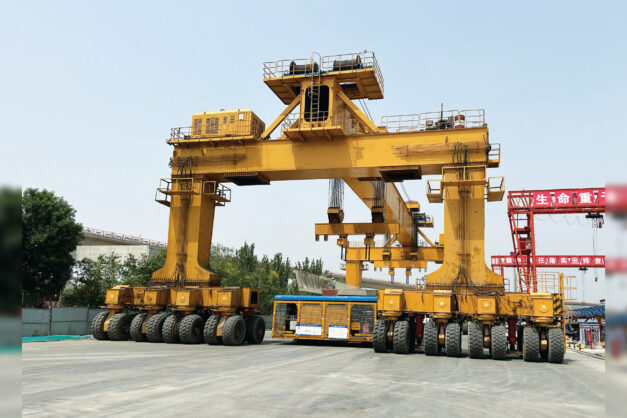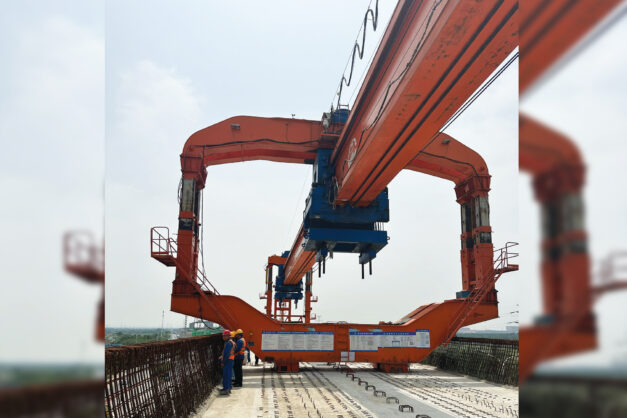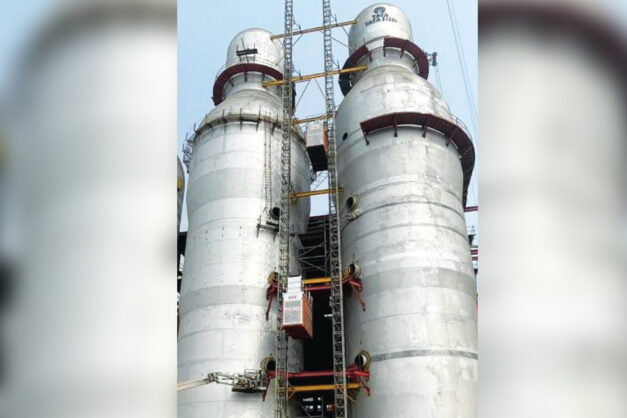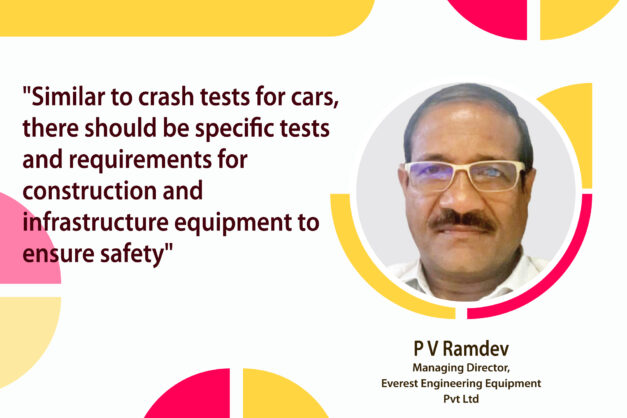The lack of defined standards presents safety issues for India’s construction and infrastructure sector. In this interview, P V Ramdev, Managing Director, Everest Engineering Equipment Pvt Ltd, talks about the shortcomings of the safety regulations that are in place, especially about machinery like tower cranes, and the necessity of conducting specialised tests akin to crash tests for cars to enhance overall safety.
“Similar to crash tests for cars, there should be specific tests and requirements for construction and infrastructure equipment to ensure safety”
How can we improve and enforce safety regulations for construction and infrastructure equipment to align with international standards and reduce accidents?
The primary issue lies in the Indian government’s lack of distinct safety regulations, unlike the precise and clear laws in countries like the United States and the European Union. India urgently requires comprehensive safety guidelines for all construction and infrastructure equipment to prevent frequent accidents. These guidelines should span the equipment’s entire lifecycle, from manufacturing to operation. High staff turnover complicates training on safety practices, making it crucial for the government to enforce rigorous operational and safety standards across all equipment types.
Moreover, while apex industry bodies hold the power to set safety norms, their current focus often needs to be narrower. For example, safety evaluations for equipment such as tower cranes are predominantly based on lifting capacities, neglecting other essential aspects of operation and design. There’s a need for broader scrutiny, akin to the comprehensive testing protocols for automobiles, ensuring construction and infrastructure equipment meet stringent safety requirements.

What role does innovation play in your product development strategy?
In the past, conventional construction machinery in India did not prioritise speed, accuracy, and power efficiency. Our present focus is on correcting these flaws, with a concerted effort to improve the speed, precision, and power efficiency of our construction and infrastructure equipment. At the heart of our product development approach is a commitment to innovation, critical in elevating these important aspects of modern construction practices.
What are the driving factors and industry responses to the increasing trend of equipment rental over ownership in the post-COVID business landscape?
In the wake of COVID-19, businesses are increasingly turning towards renting equipment rather than expanding their fleets. Various compelling reasons, including financial and operational benefits drive this shift. Opting for rentals allows companies to bypass the heavy expenses of buying and maintaining a fleet.
The industry’s reaction to this shift has been notably positive, evidenced by the rising demand for rental equipment. This trend is particularly pronounced in sectors needing specific solutions like passenger hoists and anti-collision systems. The appeal of equipment leasing lies in its practicality amid economic uncertainties and its offering of a convenient, cost- effective alternative. This move towards equipment rental represents a strategic adaptation by businesses, aligning well with the unpredictable and fluctuating nature of the current market.

How do you integrate sustainable practices into products and services?
Our commitment to sustainability is obvious in our use of eco-friendly materials and our concentration on decreasing power consumption. We have effectively achieved exceptional power reductions of roughly 35-40 percent across our equipment through concerted efforts. Furthermore, our strategy push towards digitising entails integrating digital components and computer systems, considerably improving operational efficiency. This shift allows for seamless remote monitoring of equipment nationwide, supporting our environmentally friendly practices.
Being the only CRISIL-rated construction equipment service company in India is noteworthy. How has this rating influenced your standing in the industry?
Important elements such as our company’s growing client base, sound financial standing, high sales, and steady provision of high-calibre services are all considered in our CRISIL rating. With an impressive CRISIL rating of MSE 3, which denotes efficient operations and prudent financial management, we presently hold this level and are dedicated to continuous improvement in all assessed areas. We are committed to constant improvement and take a proactive approach to it. Our objective for the upcoming year is to undergo another thorough evaluation to obtain an improved rating, demonstrating our consistent and growing pursuit of excellence.

With Excon 2023 approaching, what strategies has EEE devised to make the most out of this exhibition?
For more than ten years, we have been taking part in exhibitions. We are introducing a revolutionary passenger hoist that hasn’t been seen in the market at the Excon 2023. We will also showcase HCR Malaysia’s infrastructure equipment and cutting-edge tower crane anti-collision technologies.
This product, made by the well-known international company GJJ, is quite surprising. However, given that there will be a major reveal at the event, I cannot provide further information now. In addition to our new line of special products, we will have models of some enormous equipment that we could not fully present because of their massive size, such as modular transporters and standard carriers. Furthermore, we will showcase our most recent tower crane anti-collision technology, which has various improvements.
Cookie Consent
We use cookies to personalize your experience. By continuing to visit this website you agree to our Terms & Conditions, Privacy Policy and Cookie Policy.





















